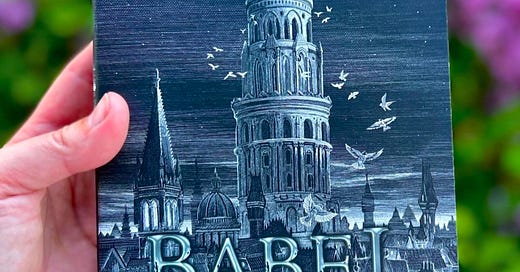Review of Babel by RF Kuang
“Language was just difference. A thousand different ways of seeing, of moving through the world… And translation a necessary endeavour, however futile, to move between them.”
Robin Swift is a young Cantonese boy who is spirited away from his homeland to study under an eminent scholar at Oxford. But this isn’t just any old Oxford—it’s the Oxford of an alternate reality set in the 1800s, where magic is real. And that magic is crafted at the Oxford translation center, lovingly referred to as Babel.
When Robin finally gets into his senior year at Babel—clawing his way through a systemically racist institution as a Chinese immigrant—he’s suddenly confronted by the fact that the institution he loves is directly responsible for the British imperialist regime. It’s because of their translations, his magic work, that the British army has faster ships and more powerful weapons. It’s because of Babel that the world is falling under colonial powers. Will he betray his homeland and continue working for Babel? Or will he take up arms against the very institution that sponsored his survival?
It’s quite an accomplishment to make a novel that’s largely about the intricacies of linguistics accessible, let alone exciting.
I’m a huge word nerd (obv) so all of the sidebars into the roots of archaic words were so much fun! And the magic system was definitely novel; I’d never heard of anything it this before.
But the magic didn’t *quite* hit the mark for me. It wasn’t explained enough until it really mattered, which made it all seem a bit overly convenient.
I found the protagonist a bit dull—he was the type of character to whom things happen, rather than the type who makes things happen around him based on his values and motivations. In other words, he was too malleable for my taste.
Finally, y’all know I don’t love a long ass book, and this was no exception. More aggressive editing could’ve made this story an absolute win for me. But the additional and unnecessary 50-100 pages made me feel bored and distracted—up until the final 10 or so pages, where shit really goes down.
All in all, an excellent book that had some flaws.
4 stars
⭐️⭐️⭐️⭐️




